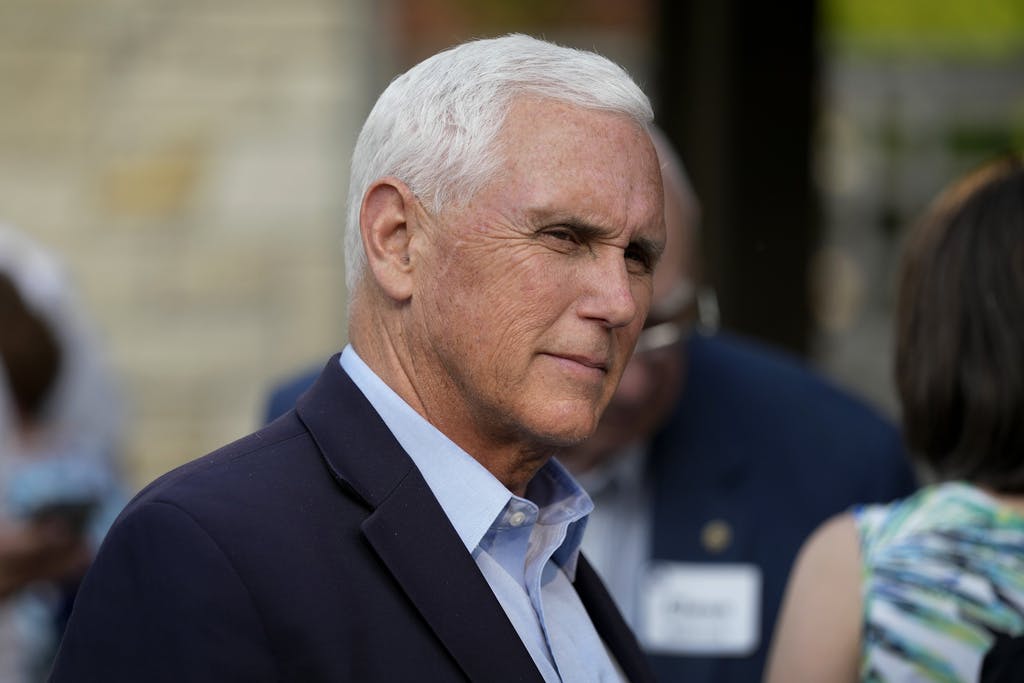Jack Smith Doubles Down on Charging Trump for Showdown With Mike Pence, Dares Supreme Court To Deliver Him a Second Defeat
The special counsel insistence on keeping the erstwhile vice president in his indictment risks another Supreme Court reprimand.

Special Counsel Jack Smith’s immunity brief is due to Judge Tanya Chutkan on September 26, and expect swaths of it to concern President Trump’s interactions with Vice President Pence.
Mr. Smith kept those colloquies in his slimmed-down superseding indictment, even as he cut other elements of his case. The second charge sheet is nine pages shorter than the original, though it keeps all four of the original charges. The edits came after the Supreme Court’s ruling in Trump v. United States that all official presidential acts are presumptively immune, while unofficial ones are not.
Chief Justice Roberts’s majority opinion determined that Trump’s engagements with the Department of Justice are “absolutely immune” because of the president’s “exclusive authority over the investigative and prosecutorial functions of the Justice Department and its officials.” A president, the chief writes, “cannot be prosecuted for conduct within his exclusive constitutional authority.” Mr. Smith yielded on this front.
The special counsel also alleges that the 45th president “attempted to enlist the Vice President to use his ceremonial role at the January 6 certification proceeding to fraudulently alter the election results.” The justices, though, discerned that “whenever the President and Vice President discuss their official responsibilities, they engage in official conduct. Presiding over the January 6 certification proceeding at which Members of Congress count the electoral votes is a constitutional and statutory duty of the Vice President.”
While that does not amount to the red light that the high court imposed on evidence Mr. Smith adduced from the Department of Justice, the conclusion that “Trump is at least presumptively immune from prosecution” for his interactions with his vice president amounts to at least a yellow warning signal. The special counsel, though, kept that material in his new indictment.
Trump has already indicated that he intends to challenge that inclusion before Judge Chutkan, who is tasked with conducting proceedings consistent with the Supreme Court’s ruling in Trump. In a preliminary filing, the former president’s attorneys write that he “may file a motion to dismiss focused specifically on the Special Counsel’s improper use of allegations related to Vice President Pence.”
Judge Chutkan’s assignment is to determine whether the material referencing Mr. Pence poses “any dangers of intrusion on the authority and functions of the Executive Branch,” but it will be Mr. Smith’s burden to overcome the presumption of immunity that the high court found attaches to those interactions. The superseding indictment refers to Mr. Pence as “President of the Senate” and as Trump’s “runningmate,” but those circumlocutions seem unlikely to assuage the justices’ separation of powers concerns.
If Judge Chutkan and the the District of Columbia Circuit of the United States Court of Appeals rule that the material related to Mr. Pence passes the high court’s test, Trump could appeal any decisions related to immunity to the Supreme Court. The New York Times discloses that a memorandum authored by the chief “tore into the appellate court opinion greenlighting Mr. Trump’s trial, calling it inadequate and poorly reasoned.” That suggests that he would not hesitate to overrule lower courts again.
Even if Mr. Smith’s indictment is not dismissed in its entirety, a ruling that carves out references to Mr. Pence would leave the case in dire straits — and possibly require the special counsel to convene a third grand jury to hand up charges on yet another iteration. At that point, Attorney General Garland — or whoever serves as America’s next chief law enforcement officer — could decide the case is no longer viable.
Mr. Smith’s gamble of keeping Mr. Pence in his indictment is compounded by the strictures that the Supreme Court has imposed on the government’s efforts to marshal evidence. Judge Chutkan is required to discern which acts are official and which are unofficial “without considering the President’s motivations.” Chief Justice Roberts adds that “testimony or private records of the President or his advisers probing such conduct may not be admitted.” Instead, “objective analysis of ‘content, form, and context’” is demanded.
It could be that Mr. Smith reckons that his election interference case, which revolves around the events of January 6, 2021, would not persuade a jury to bring in a “guilty” verdict without reference to Mr. Pence. His indictment spotlights Trump’s tweet from that day declaring, “If Vice President@Mike_Pence comes through for us, we will win the Presidency. Many States want to decertify the mistake they made in certifying incorrect & even fraudulent numbers in a process NOT approved by their State Legislatures (which it must be). Mike can send it back!”
Now, it could be the daring decision to include those details that send Mr. Smith back to the Supreme Court — for another, and possibly final, defeat.

